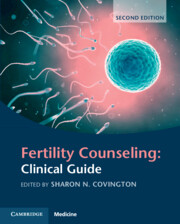Book contents
- Fertility Counseling: Clinical Guide
- Fertility Counseling: Clinical Guide
- Copyright page
- Dedication
- Contents
- Preface
- Contributors
- I Introduction
- II Therapeutic Approaches
- Chapter 3 Fertility Counseling for Individuals
- Chapter 4 Fertility Counseling for Couples
- Chapter 5 Fertility Counseling with Groups
- Chapter 6 A Sexual Therapy Primer for Fertility Counselors
- Chapter 7 “It’s Complicated”: The Intersect Between Psychiatric Disorders and Infertility
- Chapter 8 “Be Fruitful and Multiply”: Addressing Spirituality in Fertility Counseling
- III Third Party Reproduction: Assessment and Preparation
- IV Addressing the Needs of Diverse Populations
- V Special Topics in Fertility Counseling
- VI Practice Issues
- The International Glossary on Infertility and Fertility Care, 2017
- Index
- References
Chapter 7 - “It’s Complicated”: The Intersect Between Psychiatric Disorders and Infertility
from II - Therapeutic Approaches
Published online by Cambridge University Press: 24 November 2022
- Fertility Counseling: Clinical Guide
- Fertility Counseling: Clinical Guide
- Copyright page
- Dedication
- Contents
- Preface
- Contributors
- I Introduction
- II Therapeutic Approaches
- Chapter 3 Fertility Counseling for Individuals
- Chapter 4 Fertility Counseling for Couples
- Chapter 5 Fertility Counseling with Groups
- Chapter 6 A Sexual Therapy Primer for Fertility Counselors
- Chapter 7 “It’s Complicated”: The Intersect Between Psychiatric Disorders and Infertility
- Chapter 8 “Be Fruitful and Multiply”: Addressing Spirituality in Fertility Counseling
- III Third Party Reproduction: Assessment and Preparation
- IV Addressing the Needs of Diverse Populations
- V Special Topics in Fertility Counseling
- VI Practice Issues
- The International Glossary on Infertility and Fertility Care, 2017
- Index
- References
Summary
The experience of Infertility is extremely stressful for all people.The goals of this chapter are to provide the mental health practitioner with an understanding of the relationship between infertility in men and women and psychiatric illnesses. Patients with a history of major depression are at an increased risk of recurrence of major depression during infertility evaluation and treatment, and women who have had recurrent miscarriages are especially high risk for depression. Some patients will need to continue their antidepressants during the infertility process and pregnancy, and in this chapter we will discuss the risks and benefits associated with antidepressants in this population. Research on the interaction of the infertility medications and bipolar disorder destabilization is lacking, but it is important for the mental health practitioner to recognize that the dramatic hormonal changes associated with ovarian stimulation may lead to increased lability, especially if the medications have the side effect of insomnia. While some mood stabilizers such as lamotrigine are considered relatively safe to take in pregnancy, others, such as valproic acid are associated with congenital abnormalities and should be discontinued. Personality disorder patients may also react to the stress of infertility treatment with primitive defenses that are difficult for the infertility treatment team to manage, such as acting out and splitting. In this chapter, we will discuss the intersection of personality disorders and psychiatry and we will also provide guidance about when to recommend that patients defer or stop infertility treatment due to psychiatric illnesses.
Keywords
- Type
- Chapter
- Information
- Fertility Counseling: Clinical Guide , pp. 79 - 87Publisher: Cambridge University PressPrint publication year: 2022
References
- 1
- Cited by



